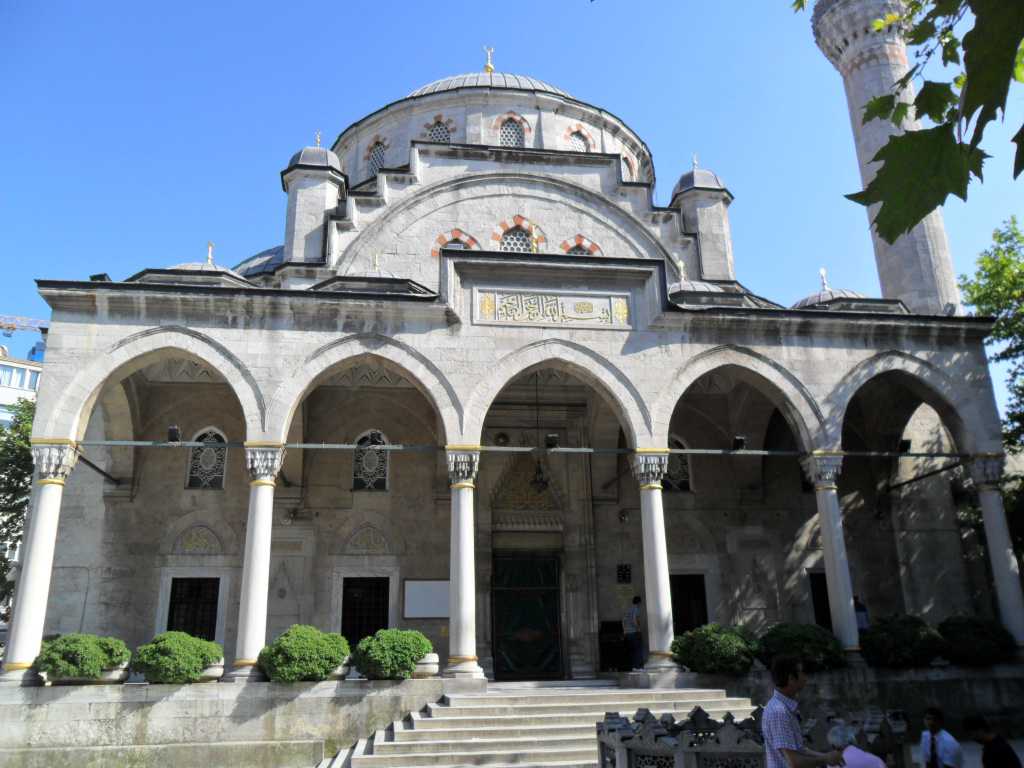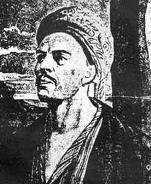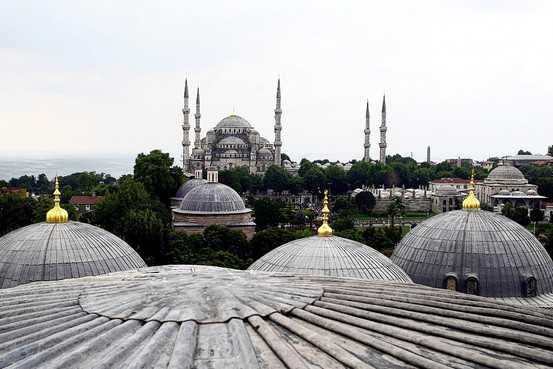Over the past several months Jon has been spanning the globe from Indonesia to Turkey, perhaps still licking his wounds from the suffering I administered to him on the basketball courts of Valparaiso, Indiana back in the early 90s. He sends along the following reflections on his experiences in Istanbul. This is a little bit off the usual topics for our blog, but consider this some lazy summer blog reading, like a Calvin Trillin essay in the New Yorker.
by Jon Pahl, in Istanbul

In 1880, Mark Twain published an essay destined to be famous. “The Awful German Language,” in A Tramp Abroad, lampooned the difficulty Twain experienced learning German. It is very funny. I remember laughing out loud to the point of tears the first time I read it, at Regenstein Library of The University of Chicago.
Twain’s essay comes to mind because I have been living in Istanbul for two weeks trying to learn some Turkish. In Turkish, as in German, verbs come at the end of sentences, and word order is generally reversed from English. This makes Turkish difficult (zor). But the language is also beautiful (güzel). Twain hit more than a few ethnocentric notes in his piece, and it clearly reflects, in retrospect, the stereotype that eventually became “the ugly American.” The essay’s humor mutes its xenophobia, but “The Awful German Language” also reveals a moment in time when America’s empire began to swing into power.
My own take on Turkish, as a twenty-first century American, is quite different from Twain’s take on German in the nineteenth century—and not only because I lack his satirical gifts. I am studying the language as I begin research for an English language biography of the influential but controversial Turkish imam Fethullah Gülen. My experience of the language invariably is filtered through my reading of Gülen’s Sufi-inspired thought.
Contemporary Turkish is a modern creation. It emerged along with the Republic in the early twentieth-century, and it was a cornerstone in Ataturk’s attempt to unify (and imagine) a new nation as the Ottoman Empire crumbled. I have argued elsewhere (in a review of Orhan Pamuk’s The Museum of Innocence—see that Turkey’s post-imperial reality offers many lessons for Americans. Some of the most profound of the things we might learn from Turkey may be revealed in the structure and harmonies of the language. I make no claim that these structures are unique to Turkish, but they can help me articulate six insights I have noted in the course of living here in Istanbul for a brief stretch.
First, in Turkish, relationships trump subjective assertions. Subjects and objects are juxtaposed in most sentences. This makes the relationship between subject and object primary, and the action of an individual secondary. The subject of a sentence, such as “I,” is often dropped completely and embedded within a verb. For instance, take the verb sevmek, “to love.” To say “I love you” one can say “Ben seni seviyorum” (literally, “I you love”). But more frequently one would hear simply: “Seni Seviyorum.” Here, the “I” doing the loving is not the primary thing; the “I” is embedded within the love (as the ending, “um.”) Despite Atatürk’s attempt to extinguish Sufism in Turkey, I am willing to wager that this linguistic structure reveals the deep influence of Sufi Islam—historically important across Turkey. For Sufis, the ego is illusion. There is no “you and me,” but there are moments in time marked by relationships, and, ideally, by love.
Secondly, there is a poetic rhythm to Turkish that reflects what I have taken to calling “oral mimesis,” and in which I find a sign of the famous Turkish hospitality that I have experienced on all four of my visits here. The most evident form of this feature of Turkish is called “vowel harmony.” Endings to adjectives and verbs that convey the nature of a relationship (like that “um” in seviyor) vary depending upon the last vowel in a word. Thus, to add an “I” to a transitive verb might mean adding um, im (eem), üm (yewm), or ım (uhm), depending on the last verb preceding the ending. I’m barely beginning to figure this out after two weeks of study, but what it produces is a rhyming quality to the language that means sounds mirror each other. Thus, for example, the adjective “güzel” takes “i” (pronounced like the long English “-e”) for its endings. This means that if I wanted to say “You are beautiful” (something I’ve often thought here in Istanbul!) I might say: “Sen güzelsin” (phonetically—“sen gew-sel-seen”). I think that has a very nice ring to it. Such oral (and aural) mimesis is common throughout the language, in manifold everyday exchanges and encounters. It’s like a smile returning a smile, linguistically, and builds into ordinary language a verbal form of hospitality.
Thirdly, assigning of gender is not primary in Turkish. Unlike in German, nouns don’t take genders, and the third person singular pronoun “o” can mean either “he, she, or it.” I know that for some Turkish feminists there is a sense that masculine is the default gender. For instance, Mustafa Kemal is honored with the name “Atatürk” (“Father of the Turks”). There is not, so far as I know, a similar equivalent for women (the “Mother of the Turks?”) But in the structure of the language, identity is grounded in something other than in gender. This lack of gender differentiation was clearly part of Atatürk’s modernization project—which might explain in part why issues such as veiling continue to be so contested in contemporary Turkish society, as Pamuk’s novel Snow vividly explores. One of my American Muslim students explained to me that she wore the hijab because “I want people to see me as a Muslim before they see me as a woman.” But in Turkey, wearing the veil has actually become an assertion of gender differentiation—and hence, a counter-cultural statement. The language, at least as I understand it so far, however, implies structural equality.
Fourthly, Turkish operates by what one of my teachers (a Ukrainian named Tarkan) called “mathematical logic,” but in which I see a military precision that produces a guarded (if not conspiratorial) mentalité that competes with the hospitality I alluded to earlier. My brain hurts after three hours of Turkish class, not only because I have little skill at mathematics, but also because the calculus is so complex that my efforts to intuit “the answers” are frustrated by the intensity of the process. Such intensity, and a less-than-transparent set of rules to govern it, marks one of the challenges contemporary Turkey faces in its efforts to “democratize.” The military is often described as the “guardian” of modern Turkey. Some people here are worried about how religion (notoriously NOT mathematically precise) might undermine this custodial responsibility. Whether a balance can be struck between the poetic intuitions and revelations of, say, The Holy Qur’an, and the guarded, militarily precise structures that are embedded in modern Turkish may hold the key to the most hotly debated questions in the country today. The optimistic answer is that the debates are underway. But recent imprisonments of military leaders and journalists, and recurrent brutal (and covert) military coups over the course of the twentieth-century, suggest that a balance between poetic trust and military security will not be easy to achieve. If, however, Turkey effectively forges a new Constitution (as is proposed under the current government), and if a way is found to welcome Turkey into the European Union as its first majority Muslim nation, then the case for Turkey as a model for the kind of societies that might emerge from “the Muslim Spring” will surely be strengthened.
Fifth, as the tension between hospitable and conspiratorial mentalities might suggest, Turkish seems to me to embrace opposites in often paradoxical ways. As someone who has written a book with the word paradox in its title (Paradox Lost), I might rightly be accused on this point of reading something into the language that’s not there. But I don’t think this is merely a projection. In a review session with another one of our beloved teachers, named Musa, we spent nearly an hour tracing the various opposites we had learned together over two weeks: burada-şurada, “here-there;” sıcak-soğuk, “hot-cold;” sol-sağ, “left-right,” and so forth.
As it happens, in my spare time I’m reading a novel by the Turkish feminist author Elif Shafak. The book is entitled The Forty Rules of Love: A Novel of Rumi. It’s a fabulous read. The evening after our review of opposites in the classroom, I came across the following passage, which Shafak places in the mouth of Rumi, the 13th century Sufi: “’God created suffering so that joy might appear through its opposite,’ Rumi said. ‘Things become manifest through opposites. Since God has no opposite, He remains hidden.’” Here, the “natural” human tendency to frame opposites (joy-suffering, friend-enemy, Christian-Muslim) gives way to a Turkish Sufi tendency to transcend them.
For one last way to clarify this point, consider the poem Bedava, by the early twentieth-century Istanbul poet Orhan Veli. I was taught the poem by a group of Polish students who were studying with me (our class is a veritable United Nations—with students from Italy, Spain, Nigeria, Kenya, Cameroon, Syria, Singapore, Serbia, and Poland—among others). Everyone I’ve asked in Istanbul knows Bedava, including the cleaning ladies in my hotel. I’ll include the Turkish first, then offer a translation:
Bedava yaşıyoruz, bedava;
Hava bedava, bulut bedava;
Dere tepe bedava;
Yağmur çamur bedava;
Otomobillerin dışı,
Sinamaların kapısı,
Camekânlar bedava;
Peynir ekmek değil ama
Acı su bedava;
Kelle fiyatına hürriyet,
Esirlik bedava;
Bedava yaşıyoruz, bedava.
For free we live, for free;
The air is for free, the clouds are for free;
Valleys and hills for free;
The rain, the mud, for free;
The outside of cars,
The doors of the cinemas
The shop windows for free;
Bread and butter aren’t free but still water is for free;
Freedom can cost your head,
Imprisoned for free;
For free we live, for free.
The lines just before the end are the paradoxical kicker. What seems to be a nice, romantic ode to the cliché that “the best things in life are free” in fact embraces a somber warning. Freedom might cost us our “heads.” We could be imprisoned, “for free.” The affirmations of the opening lines gradually give way, as modern consumerism and (implicitly) the State takeover, to a fatalistic prospect that is only redeemed with hope in the last line.
Bedava, then, does not simply mean “freedom” in a political sense (the Turkish word for that is Hürriyet). And, in the context of the poem, I am tempted to translate Bedava as something like “bound free,” “captive free,” or a similar paradox. It is this conjunction of hope and fatalism that I find intriguing and promising both in the structure of the language, and in Turkish culture.
Finally, then, what I have learned so far is that Turkey might be a budding model of the post-modern reconciliation of secularity and religion. It is too simple to call this simply “Sufism;” Turkey’s economic growth of 11% in the last quarter depended on some quite secular practices. Yet the practices of hizmet (service) among those inspired by Fethullah Gülen bridge secular and sacred modes of life. For example, Turks inspired by Gülen have built schools in more than eighty countries, including in some of the poorest places on earth. These schools follow the secular curricula of their host countries and embrace both scientific education and interreligious dialogue (I have visited such schools in Africa, Europe, Asia, and North America). What we’re dealing with here is Greg Mortensen’s Thirty Cups of Tea without the administrative incompetence (and without the publisher’s marketing budget). Such a capacity to juxtapose secularity and spirituality—perhaps woven into the very fabric of contemporary Turkish language and culture—is an important if not vital lesson for Americans, and probably for many others around the world.
One last set of experiences might clarify the possibilities. Not far from the hotel where I am staying in the borough of Şişli is the local shopping mall—Istanbul Cevahir. Naturally, given my earlier work on malls as modern “sacred places,” I had to visit. When I did, I found what I expected: a fountain out front; trees, a bright skylight, and neon inside; and a six-story labyrinthine design with two levels of food courts that quickly got me lost. My disorientation triggered the desire to acquire that malls exist to inspire wherever they are built. I spent way more than I expected in the bookstore.
And yet, barely a block away from the Cevahir is the Şişli Cami (mosque). It’s a lovely, serene place—in stark contrast to the mall. When I attended early afternoon prayer last Sunday (since my plans to attend a local church fell through), well over a hundred brothers participated. As is customary, we washed at the ablution fountain just outside the mosque, and removed our shoes to go inside. After the prayer ended, I walked out into the mosque courtyard where as I wandered about I noticed a casket shrouded in black cloth laying on a table under a canopy. I had stumbled onto a funeral. Gradually men gathered in lines under the canopy; women stood behind. We were still; silent in respect for one who had died. After a few minutes, and a few prayers, people began to drift away, and I joined them.
The coexistence of these two places—of bumptious commerce that invites unlimited desire and quiet prayer that acknowledges the limit of death—signals a juxtaposition of the secular and sacred that all humans struggle to negotiate. How these two places co-exist in Istanbul became somewhat clearer to me one day last week. After our three hour morning class, with my brain still throbbing, I set out for Ayasofya (Hagia Sophia). As I walked through the massive gates, onto the ancient stone floors, under the stunning dome, I imagined the prayers of my ancestors in the Christian faith rising like incense for well over a millennium in this very spot.
Then, that night I attended a concert at Istanbul Open Air Theater. This performance space is built like a Roman amphitheater into the side of a hill, with a lovely view over the Bosphorus. It was a beautiful night with almost a full moon. The concert was sold out, and I couldn’t afford tickets anyway, so I stood on a terrace with a great view overlooking the theater, for free. I could hear fine. I was joined by the four Polish students from my class, and there we met a fascinating architect and Istanbul resident who described himself as a pagan Communist Muslim environmentalist.
The evening’s concert—part of the 2011 Istanbul Jazz Festival–culminated in a 90 minute set by Natalie Cole, who sang one of my favorite songs: “This Will Be.” By then, I was in the theater—having walked in, for free, and under the guidance of my new friend, to a seat about 20 rows from the front. I sang along with Natalie Cole, as did many of the three thousand who were in attendance, perhaps in a language they understood no more than I understand Turkish: “This will be, an everlasting love. . . .” It was, in the words of another song Cole performed, unforgettable.
Somehow, between the mall and the mosque and Ayasofya and “This Will Be” in a Roman-like amphitheater in the ancient city of Istanbul, it all seemed to come together. Maybe it was just the nearly full moon, and the great music, and the beer a friendly vendor sold to us while standing on the terrace. But I couldn’t help but think that somehow in this fascinating conjunction of experiences lay the possibilities for much of the rest of the world, even as I continue to struggle to learn the güzel, but zor, Turkish language.
Posted by Paul Harvey
http://usreligion.blogspot.com/2011/07/guzel-but-zor-turkish-language.html



